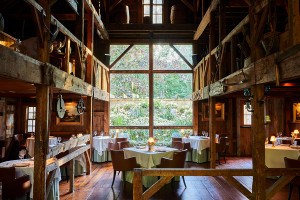Dining Out: Modern Greece
Mezé Estiatorio has a lot going for it: a waterfront location with a stunning full-on view of the Zakim Bridge; a sweeping, light-toned room; and full-length windows that turn a rounded corner, with sidewalk tables outside in fine weather. It's a grand urban café in a new part of the city, the sprawling dark-brick development between the Charlestown marina and City Square.
We certainly need a good Greek restaurant. Few cuisines are as seductive, or as misunderstood, here. Greek food is roughly in the position Italian food was in the 1960s—a selection of famous dishes, all made in more or less the same tasty but undistinguished way that reveals practically none of the subtle freshness of the real thing. Souvlakia, moussaka, stuffed grape leaves, baklava: They're universal, and utterly different from what you think when you have them made by someone who cares about tradition, flavor, ingredients, and technique.
For that, you'll have to wait for next year's late September round of fairs and food festivals at Greek Orthodox churches around town. Mezé is offering something different. The idea is to update Greek food for the present day and leave room for the creativity of non-Greek cooks. All of which is admirable and justified, and I respect the let's-be-modern mindset of executive chef and co-owner Paul Delios, who at the popular Charlestown restaurant Paolo's Trattoria showed he could turn out wood-oven pizza and other dishes inspired by his grandmother's cooking on the Greek island of Chios (a wonderland for seekers of rustic Greek cuisine).
At Mezé, Delios and his co-owners, Bill Galatis and Chuck Samiotes—all strong supporters of the Greek community—decided to combine Old World with New, and they hired an American, David Fitzgerald, to be chef de cuisine. Fitzgerald told me on the phone that he ate in many Greek restaurants in New York City and San Francisco for inspiration—no pilgrimages to Greek grandmothers for him—and thought he could bring new life to old classics and make them live in a modern context by using “finesse” to cook them “correctly.” Unimaginative traditionalist that I am (and lucky veteran of a trip to Chios organized by our own Oldways Preservation and Exchange Trust with culinary luminaries including Aglaia Kremezi, author of The Foods of the Greek Islands), I longed for the classics the whole time I ate at Mezé.
I had a long time to long. Service is all but nonexistent, even though the black-clad waiters are almost ubiquitous—and seem always in a hurry to go anywhere but your table. Several times I had to get up and entreat help, running a gauntlet of breathless, not-my-table responses. Waits were sometimes so protracted that in one case, an order of pasta—admittedly placed late, just as our main courses arrived—came after the desserts had been served. Say that was our fault; but waits for drink, food, bread, and, most especially, a waiter willing to serve us stretched on and on.
I yearned for the classics because so many dishes came close to being superb tastes of a proud country. None was more impressive in this regard than gigantes beans in a simple tomato sauce fragrant with garlic and oregano ($8), with a sweet piquancy from cumin and from cayenne, which Fitzgerald told me he likes adding to most everything. This was a tomato sauce to dream about, and the beans were melting, slightly floury, and full of flavor. Our table went through two orders fast.
We wanted to do the same with dolmades ($9), a warhorse Fitzgerald treats with both invention and respect, freshening the rice stuffing with shredded zucchini and parsley, dill, and lemon, and reinforcing the freshness with post-steaming seasoning. These unoily packages are impressively better than what you get in tins and coffee shops.
An order of avgolémono ($8), too, couldn't have been richer in chicken flavor, with soothing rice and root vegetables to give texture rather than the usual egg white, egg-drop-soup effect. The egg whites are instead whipped and baked in a floating pompadour that would give Donald Trump pause. It certainly stopped me. Reimagining this soup was not a good idea. Nor was making a silly stack of many of the components of horiatiki ($11), the salad that launched a thousand luncheonettes. Nice tomatoes, nice feta (from Topsfield, the chef told me), good lemon-oregano vinaigrette, but a useless and annoying presentation.
Main courses are frustrating, too, less for the sometimes too-thought-out presentation than for the variability in flavor. The lamb shank ($28), for instance, in a sweet chile sauce with balsamic vinegar and lemon, could have been a bit more tender, but had a full flavor reminiscent of short ribs. The grilled wild salmon ($27) was acceptable, but the green-bean-and-tomato stew beneath it was a pallid disappointment, and the long wedges of Yukon Gold potatoes with it and many other dishes tasted steamed and undercooked. (Fitzgerald told me they were roasted separately; perhaps the pans are too tightly packed.) The baked shrimp in spicy tomato sauce ($15) was fine, but pretty dull.
Mezé is a gamble. The saganaki ($9), made with a fried white cheese called kefalotyri—a dish that must be eaten fresh and hot—was inedibly salty and arrived cool and greasy. But the spanakopita ($9), usually greasy and boring, are fried to order rather than baked; the phyllo is wonderfully buttery and crisp, the filling absolutely fresh and not oversalted. This is worthwhile reimagining. A dish of Greek yogurt and honey ($8), a dessert that can be sublime, suffered from properly thick but characterless yogurt. Yet the dense and dark honey tasting of chestnuts was top quality.
Much is really good, then, but much mysteriously disappointing, and you have to wait too long for all of it. But the wine list is distinguished and really new, introducing varieties such as assyrtiko and aghiorghitiko that every wine lover should learn and appreciate. And the gritty, strong, fragrant coffee will bring a lump to any Greece-lover's throat. So go to Mezé Estiatorio— but with an open mind. And an open schedule.


